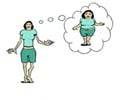While anorexia has been seen as a women's disease for long, eating disorder experts are now reporting a rise in the number of male sufferers.
Eating disorders are no longer exclusively women’s territory, say the experts. In fact, the number of men suffering from anorexia has been on the rise for quite sometime now.
Some even claim to have seen more male anorexia referrals than females.Professor Hubert Lacey, the head of the eating disorder unit at St George's hospital in Tooting, south London, attributes the rise in male sufferers to greater social pressure on men to look good.
"Last week for the first time ever I had more male referrals for anorexia than female. That was just one week this summer but I would say it has been increasing steadily in the past two or three years," the Independent quoted him as saying.
His words came in the wake of a recent report that the number of men treated for anorexia had increased by 67 per cent in the past five years.
Men now account for between five to 10 per cent of all eating disorder sufferers, said the report.
"The disorder is still much more prevalent in females than males but the main increases have been in teenage boys. A few years ago it was often the case that my ward had no men on it. Now, on a ward of 20, I have three men," Lacey said.
Advertisement
He said that many men were going untreated because they saw anorexia as a "women's disease".
Advertisement
"I know of some hospitals that don't treat any men because of this rule. Because more females are referred for treatment some places have had to make a choice between the two and have chosen to treat women," he said.
"It's a shame, because while I can see why the rule is in place, the symptoms are exactly the same. They all have an intense fear of natural body weight," he added.
Mark Reilly of the eating disorder charity, B-eat, has welcomed Lacey's observations.
He said: "Research suggests that 100,000 men in the UK have anorexia or bulimia, but that is based on the men who come forward. The true figure is much higher. There are still many blokes who don't want to talk about health issues, including anorexia."
Steve Blacknell, 56, a former anorexia and bulimia sufferer from Kent, said: "It used to be that women might look at a stick-thin model on the front of a magazine, and be desperate to look like the model. That was never an issue for men. But nowadays men look at magazines and see guys with washboard stomachs and want to look the same. It is really dangerous."
Source-ANI
TAN/M








